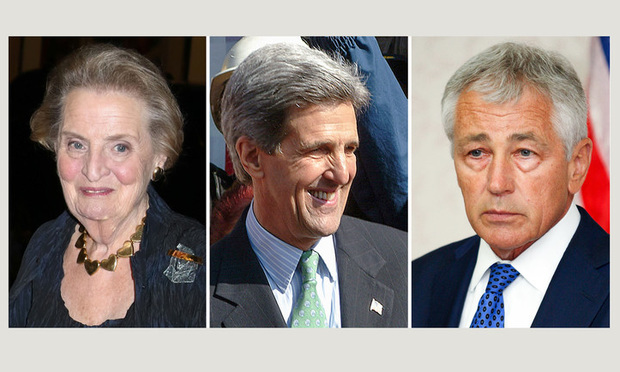Yale Law Clinic Teams Up With Heavy Hitters on Mexico Border Controversy
The school's Rule of Law Clinic assisted in drafting a joint declaration opposing President Donald Trump's declaration of a national emergency at the Mexico border signed by 60 former national security experts, including Madeleine Albright and John Kerry.
February 28, 2019 at 04:14 PM
4 minute read
 Madeleine Albright (from left), John Kerry and Chuck Hagel.
Madeleine Albright (from left), John Kerry and Chuck Hagel.
Amid the controversy over President Donald Trump's declaration of a national emergency at the Mexico border, a small cadre of Yale Law students has been key in arming a bipartisan group of national security heavyweights to oppose the move.
Sixty former national security officials, including former Secretaries of State Madeleine Albright and John Kerry and former Defense Secretary Chuck Hagel, this week released joint declaration laying out their myriad arguments against Trump's emergency declaration in hopes of swaying lawmakers to oppose it.
Behind the scenes, a half-dozen students in Yale Law School's Rule of Law Clinic worked for weeks to research the matter and help draft the joint declaration, which in addition to being placed in the Congressional Record will be filed as part of the court record in the lawsuits challenging the emergency declaration.
The declaration was released the day before the U.S. House of Representatives voted to block Trump's declaration of a national emergency at the border with Mexico—a move that is largely intended to bolster lawsuits challenging the declaration, given that the president is likely to veto any bill that might emerge from the Senate.
Others among the signatories of the joint statement are former CIA Director John Brennan, former Defense Secretary Leon Panetta, former Homeland Security Secretary Janet Napolitano and former United Nations Representatives Susan Rice and Samantha Power.
“We have lived and worked through national emergencies, and we support the President's power to mobilize the Executive Branch to respond quickly in genuine national emergencies,” the joint declaration reads. “But under no plausible assessment of the evidence is there a national emergency today that entitles the President to tap into funds appropriated for other purposes to build a wall at the southern border.”
Second-year law student Danielle Zucker said she and five other classmates from the clinic—their group adopted the nickname Blue Steel—waded through hundreds of emails as they helped shepherd the draft through multiple revisions, wrote footnotes and conducted research. They began working on the project weeks before Trump actually declared a national emergency on Feb. 15.
“It's exciting to take an issue that's something I care about and is something all the people who signed on care deeply about—and to feel like you are a part of a group that's having an effect on the national conversation,” Zucker said in an interview Tuesday, shortly before the House vote. “All the students working on it were pretty motivated to put in the time and get this right.”
The joint declaration was an outgrowth of an earlier policy statement that the Rule of Law Clinic helped 10 former national security officials release in opposition to Trump's travel ban. Those 10 original signatories helped circulate the new document highlighting problems with the border emergency declaration among an even wider group of national security colleagues. They sought out experts in counterterrorism, human trafficking, relations with Mexico and other areas that touch the border emergency debate, said clinic instructor and former Yale Law Dean Harold Koh.
“Somebody has to make an assessment that there is an emergency,” Koh said. “Trump is asserting no facts and putting forth no experts. And here are people who dealt with national emergencies their whole lives and are in fact are deferential to the claim when there is any basis to assert it.”
“The people on this list were responsible for protecting the country and did so through numerous crises through numerous presidents, Democratic and Republican alike,” Koh continued. “They ought to know the different between an emergency and a non-emergency.”
This content has been archived. It is available through our partners, LexisNexis® and Bloomberg Law.
To view this content, please continue to their sites.
Not a Lexis Subscriber?
Subscribe Now
Not a Bloomberg Law Subscriber?
Subscribe Now
NOT FOR REPRINT
© 2025 ALM Global, LLC, All Rights Reserved. Request academic re-use from www.copyright.com. All other uses, submit a request to [email protected]. For more information visit Asset & Logo Licensing.
You Might Like
View All
Law Firms Expand Scope of Immigration Expertise Amid Blitz of Trump Orders
6 minute read


Zoom Faces Intellectual Property Suit Over AI-Based Augmented Video Conferencing
3 minute readTrending Stories
- 1Uber Files RICO Suit Against Plaintiff-Side Firms Alleging Fraudulent Injury Claims
- 2The Law Firm Disrupted: Scrutinizing the Elephant More Than the Mouse
- 3Inherent Diminished Value Damages Unavailable to 3rd-Party Claimants, Court Says
- 4Pa. Defense Firm Sued by Client Over Ex-Eagles Player's $43.5M Med Mal Win
- 5Losses Mount at Morris Manning, but Departing Ex-Chair Stays Bullish About His Old Firm's Future
Who Got The Work
J. Brugh Lower of Gibbons has entered an appearance for industrial equipment supplier Devco Corporation in a pending trademark infringement lawsuit. The suit, accusing the defendant of selling knock-off Graco products, was filed Dec. 18 in New Jersey District Court by Rivkin Radler on behalf of Graco Inc. and Graco Minnesota. The case, assigned to U.S. District Judge Zahid N. Quraishi, is 3:24-cv-11294, Graco Inc. et al v. Devco Corporation.
Who Got The Work
Rebecca Maller-Stein and Kent A. Yalowitz of Arnold & Porter Kaye Scholer have entered their appearances for Hanaco Venture Capital and its executives, Lior Prosor and David Frankel, in a pending securities lawsuit. The action, filed on Dec. 24 in New York Southern District Court by Zell, Aron & Co. on behalf of Goldeneye Advisors, accuses the defendants of negligently and fraudulently managing the plaintiff's $1 million investment. The case, assigned to U.S. District Judge Vernon S. Broderick, is 1:24-cv-09918, Goldeneye Advisors, LLC v. Hanaco Venture Capital, Ltd. et al.
Who Got The Work
Attorneys from A&O Shearman has stepped in as defense counsel for Toronto-Dominion Bank and other defendants in a pending securities class action. The suit, filed Dec. 11 in New York Southern District Court by Bleichmar Fonti & Auld, accuses the defendants of concealing the bank's 'pervasive' deficiencies in regards to its compliance with the Bank Secrecy Act and the quality of its anti-money laundering controls. The case, assigned to U.S. District Judge Arun Subramanian, is 1:24-cv-09445, Gonzalez v. The Toronto-Dominion Bank et al.
Who Got The Work
Crown Castle International, a Pennsylvania company providing shared communications infrastructure, has turned to Luke D. Wolf of Gordon Rees Scully Mansukhani to fend off a pending breach-of-contract lawsuit. The court action, filed Nov. 25 in Michigan Eastern District Court by Hooper Hathaway PC on behalf of The Town Residences LLC, accuses Crown Castle of failing to transfer approximately $30,000 in utility payments from T-Mobile in breach of a roof-top lease and assignment agreement. The case, assigned to U.S. District Judge Susan K. Declercq, is 2:24-cv-13131, The Town Residences LLC v. T-Mobile US, Inc. et al.
Who Got The Work
Wilfred P. Coronato and Daniel M. Schwartz of McCarter & English have stepped in as defense counsel to Electrolux Home Products Inc. in a pending product liability lawsuit. The court action, filed Nov. 26 in New York Eastern District Court by Poulos Lopiccolo PC and Nagel Rice LLP on behalf of David Stern, alleges that the defendant's refrigerators’ drawers and shelving repeatedly break and fall apart within months after purchase. The case, assigned to U.S. District Judge Joan M. Azrack, is 2:24-cv-08204, Stern v. Electrolux Home Products, Inc.
Featured Firms
Law Offices of Gary Martin Hays & Associates, P.C.
(470) 294-1674
Law Offices of Mark E. Salomone
(857) 444-6468
Smith & Hassler
(713) 739-1250








